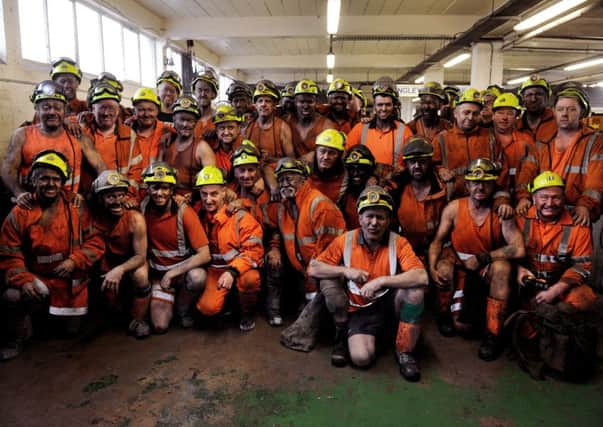YP Comment: Rich new seam for coalfields? Osborne should seize initiative


Margaret Thatcher, so fixated by her ideological battle with Arthur Scargill, did not appreciate that such areas would require massive state intervention to generate new jobs. The same with her successor John Major – he, too, was content to leave ex-miners, and their families, to the mercy of market forces.
And Tony Blair and Gordon Brown were just as culpable – let it not be forgotten that they had 13 years to rectify past wrongs and, in hindsight, Labour only began to accept that its government did not do enough to counter the North-South divide, and decline of traditional manufacturing industries, once Mr Cameron had become safely ensconced in Downing Street.
Advertisement
Hide AdAdvertisement
Hide AdYet, three months after the poignancy when miners emerged from deep underground at the end of their final shift at Kellingley Colliery, Britain’s last remaining deep coal mine, the Government – and the country – still has a political, economic and social obligation to help such communities reinvent themselves. After all, the Coalfields Regeneration Trust notes that there are only 50 job for every 100 adults of working age in Britain’s coalfields.
With Chancellor George Osborne scrabbling around for eyecatching measures to announce in Wednesday’s Budget, he could – and should – pledge to support such areas and commit himself to, for example, halving unemployment in coalfield areas by the end of this Parliament. It would pay the Chancellor to be ambitious at a time of austerity. If he achieved such targets, former miners and their families would be less dependent on the enduring benevolence of the welfare state – it’s a ‘win, win’ that Mr Osborne should embrace without delay. After all, what is there to lose?
A colossal crisis: Archbishop candid on migration
IF only the Archbishop of Canterbury, and others in authority, had listened to public concerns over uncontrolled migration before Europe became overwhelmed by refugees and asylum seekers. For, if they had acknowledged the legitimacy of these fears, rather than accusing those concerned of propagating xenophobia and racism, the EU might not be facing a crisis that could still end Angela Merkel’s career and prompt Britain to vote for Brexit on June 23.
As Dr Justin Welby said with candour: “Fear is a valid emotion at a time of such colossal crisis. This is one of the greatest movements of people in human history. Just enormous. And to be anxious about that is very reasonable.” He’s not alone; Work and Pensions Secretary Iain Duncan Smith is among those to concur with this view.
Advertisement
Hide AdAdvertisement
Hide AdHis intervention is also another reminder that the electorate is in danger of being bypassed by a now toxic referendum debate as Britain’s politicians stoop to new levels of desperation and which has even embroiled the Queen.
The Remain campaign seems unable – or unwilling – to make a positive case for Britain remaining in the EU while the Leave lobby is failing in its duty to explain how UK trade will function if voters do back Brexit.
Now Dr Welby has attempted to diffuse the migration debate, perhaps voters can now be treated with respect and have their questions answered responsibly.
Learning respect: How to teach priceless principles
IT IS apt that a captivating weekend of sport – the FA Cup quarter-finals and Six Nations rugby union are both vying for attention – should coincide with academic Andreas Schleicher’s assertion that school sport may not be the best way to teach youngsters timeless values like character, resilience and team work. Those who blossomed in such an environment will inevitably dismiss the conclusion, while others, like all those who came to dread PE lessons, will welcome the acknowledgement that other disciplines, like music, can be integral to the personal development of young people.
Advertisement
Hide AdAdvertisement
Hide AdThis is a valid distinction. After all, the primary role of all schools should extend far beyond the core curriculum and encompass themes like integrity and respect while piquing the curiosity of pupils so they are more willing to broaden their own horizons. Irrespective of whether the learning environment is a muddy pitch, or vibrant music lesson, today’s pupils are more likely to mature into responsible adults if schools retain sight of such priceless principles.